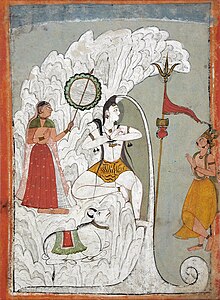Bhagiratha
| Bhagiratha | |
|---|---|
| Grandson of Sagara | |

Shiva bearing the Descent of the Ganges River, as the goddess Parvati, Bhagiratha, and the bull Nandi look on (circa 1740).
|
Bhagiratha (Sanskrit: भगीरथ, bhagīratha) was a great king who brought the River Ganges, personified as the river goddess Ganga, to Earth from the heavens. When he was prince of Sagar Dynasty, he did penance for a thousand years to gain the release his 60,000 great-uncles from the curse of saint [Kapila]in the Patala loka. While saint Kapila was meditating from years and when the 60,000 uncles were shot by the fire from the saint's eye when he was disturbed which eventually led Bhagiratha to descent of the goddess Ganga in the form of the river Ganges, to the earth when Bhagiratha heard all this from his mother and went to meditate for his 60,000 uncle's last spiritual activities To commemorate his efforts, the head stream of the river is called Bhagirathi, till it meets Alaknanda River at Devprayag.
Bhagiratha was the king of Kosala, a kingdom in ancient India. He was a descendent of the great King Sagara of the Suryavansha, or Surya Dynasty. He was one of the forefathers of Lord Rama, of the Ramayana, the epic in which Bhagiratha's tale is primarily recounted.
He lost his father when he was just a child, and was raised by his mother. Bhagiratha was very intelligent, virtuous and kind hearted. When he came of age, Bhagiratha ascended to the throne of the kingdom of Kosala, today located in the Indian state of Uttar Pradesh. He was a benevolent ruler who adhered to his duties as a king as prescribed by dharma.
Bringing Ganga back to Earth was a near impossible task and required many years to be spent in tapasya and prayer. The Kosala kings of successive generations could not do this while managing their duties as kings. As a result, the sins of the thousand princes multiplied in their destructive energy, and began resulting in natural disasters. The kingdom began to lose its peace and prosperity, and by the time Bhagiratha ascended the throne, he found it impossible to govern.
...
Wikipedia
